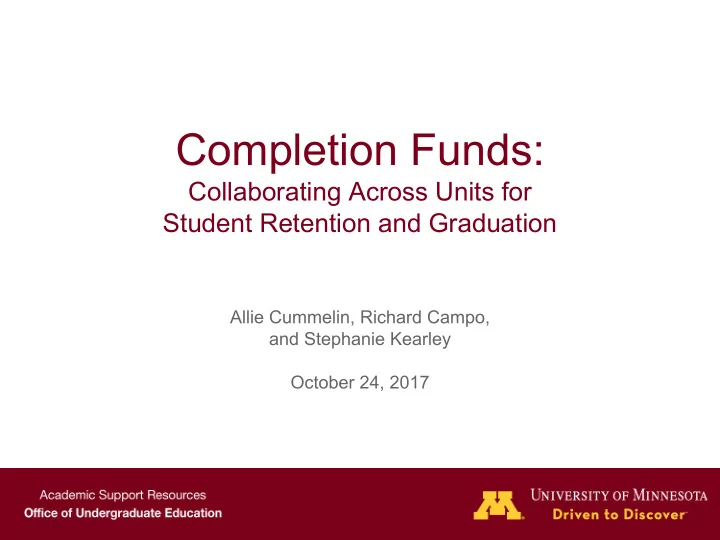

Completion Funds: Collaborating Across Units for Student Retention and Graduation Allie Cummelin, Richard Campo, and Stephanie Kearley October 24, 2017
Introductions • Allie Cummelin (Student Degree Progress) • Richard Campo (One Stop Student Services) • Stephanie Kearley (Office of Student Finance)
ASR Strategic Initiatives
Graduation Trends
Barriers to degree completion Financial • Exhausting financial aid resources • Limited financial aid for summer • Denied PLUS/private loans • Personal financial challenges Enrollment • Extending enrollment • Repeating courses • Enrolling half-time • Non-degree applicable courses • Transfer students
History of the Funds Background: • Funds formally established (Fall 2015) – Lump sum – Recurring • SWAT committee was formed (January 2016) Goals: • To remove financial barriers for students • Improve retention and graduation rates
SWAT Committee Unit representatives: • Student Degree Progress team • One Stop Student Services • Office of Student Finance • Student Account Assistance • Office of the Registrar • Office of Classroom Management • APAS (DARS) team
Nomination Process https://100mencalgary.com/wp-content/uploads/2015/02/nominate-w.png https://www.teambonding.com/wp-content/uploads/2015/06/checklist.jpg
Who can be nominated? Criteria: • Undergraduates • New high school and transfers • 6-year (or less cohort)* • Not in their last term of enrollment • Exhausted available financial aid options * Students that do not fall into this criteria component are still reviewed for financial assistance, if available.
Evaluation Process Academics Financials Personal Circumstances
Financials General: • Account balance/charges • FAFSA • Has the student initiated contact regarding finances • Sustainability • Collections • Holds Office of Student Finance: • Potential aid eligibility • Loan eligibility • Cost of attendance/need https://www.ohio.edu/chillicothe/studentservices/images/FinancialAid3.jpg • Total loan debt
Overall Success Numbers: • Total students reviewed: 268 • Awarded funds: 74 – Degree complete: 43 (58.1%) – Registered this semester: 22 (29.7%) Other: • Establishment of a formal review process • Financial aid adjustments • Financial Wellness Counseling • Job opportunities • Graduate early
Lessons Learned Financial: • Check the Cost of Attendance (COA) • Remove late fees • Other financial options (i.e. UTFL, Perkins, etc.) • Partnering with colleges/departments Non-financial: • Take a course at a community college • Petition for alternative courses to count toward degree requirements
Student Success Stories http://lynnipulse.org/wp-content/uploads/2016/03/635836528201378784-331006667_graduating-class.jpg “I can now focus on actual classes, instead of paying for them...I’m committed to my education, and it means everything to me that you were able to give me the means to do so.” “I have probably read this email 75 times in disbelief. The last couple years have not been the easiest for me financially and I had to work more and study less...I am so grateful to have been blessed with this funding. ”
Administrative Success Stories http://media.washtimes.com.s3.amazonaws.com/media/image/2016/07/27/uofminnesotagate.jpg
Food for thought! How to implement a similar program in your institution! • You do not need a lot of money - or any money! • How is your institution organized? How can you create a collaborative group? • What are some of the barriers that you frequently see students facing?
Recommend
More recommend